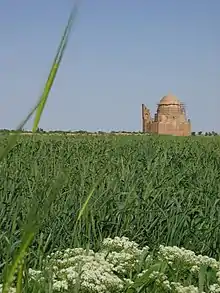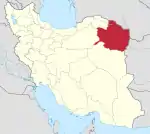Sarakhs
Sarakhs (Persian: سرخس, romanized: Saraxs, also Romanized as Serakhs)[3] is a city in, and the capital of, the Central District of Sarakhs County, Razavi Khorasan province, Iran, and also serves as capital of the county.[4] Sarakhs was once a stopping point along the Silk Road, and in its 11th century heyday had many libraries.[4] Much of the original city site is now just across the border at Serakhs in Turkmenistan.
Sarakhs
Persian: سرخس | |
|---|---|
City | |
 | |
 Sarakhs | |
| Coordinates: 36°32′33″N 61°09′32″E[1] | |
| Country | Iran |
| Province | Razavi Khorasan |
| County | Sarakhs |
| District | Central |
| Population (2016)[2] | |
| • Total | 42,179 |
| Time zone | UTC+3:30 (IRST) |
| Sarakhs at GEOnet Names Server | |
At the 2006 census, its population was 33,571 in 8,066 households.[5] The following census in 2011 counted 37,162 people in 9,984 households.[6] The latest census in 2016 showed a population of 42,179 people in 11,812 households.[2]
History

Several battles were fought in this area. According to Ferdowsi's Shahnameh the town has existed since the Afrasiab period and was named for its builder, Sarakhs, son of Godarz, by Keykavus. The surrounding oasis has been inhabited since 2nd millennium BCE and Turkmen historians consider the city to have been founded in 507 BCE. Although this is considered to be a somewhat arbitrary choice of date,[7] the section of the city called Sarahs that's now on the Turkmenistan side of the border, duly celebrated its 2500th anniversary in 1993.[8] The Mongols plundered and destroyed Sarakhs in 1221 AD.[4] In the Seljuk Era a famous school of architects was located in Old Sarakhs, and the region retains the tombs of three major 11th-century figures, two on the Turkmenistan side of today's border (those of Abul Fazl, and the 1089 Yarty Gumbez, mausoleum of Sheikh Ahmed Al Khady) and the impressive Tomb of Baba Loghman on the Iranian side. All were significantly rebuilt in the mid-19th century by the order of Naser al-Din Shah Qajar of the Qajar dynasty, who also rebuilt the current Iranian-side town .[4]
Industries and Mines
The most important industries in this city are the industries related to the extraction, refining and storage of gas, oil and sulfur resources which is rich. Aq Darband coal mine, which is now inactive after falling and killing and injuring several workers. The sand mines in the area of Qush-e Azim are also operating.
Geography
Sarakhs weather is cold in winter, warm and dry in summer thanks to the influence of the Karakum Desert. On July 7, 2021, the record high temperature of 48.7 °C (119.7 °F) was registered.[9]
Sarakhs city, with an area of more than 5,000 square kilometers, is located in the northeast of Khorasan Razavi province, next to the border between Iran and the Republic of Turkmenistan, 180 kilometers east of Mashhad. It is located approximately between the meridians 30 to 60 and 15 to 61 degrees east and between the two orbits 36 and 36 to 40 degrees north. The natural boundary of the region to the south is determined by the Kashfarud River, the eastern boundary by the Tajan River (from the confluence of the Hariroud River and the Kashfar River), and the natural western and southwestern boundaries by the last extensions of the Kopeh Dagh heights. It is bounded on the north and east by the Republic of Turkmenistan, on the west by the city of Mashhad, and on the south by the city of Torbat-e Jam.
The weather in Sarakhs has been mild and dry in the past With the expansion of irrigated agriculture and the intake of “Dousti dam”. And now, during the summer months, even in spring, the maximum temperature is 50 degrees above zero and the lowest in winter is 15 degrees below zero.
Landmarks
The main historical site of Sarakhs is the partly restored Loghman Baba mausoleum in a field just north of the town. It was built in 1356AD (757AH).
In Sarakhs district within 80 km of Sarakhs town are:
- Bazangan lake
- Mazdavand cave and reservoir
- Iran–Turkmenistan Friendship Dam
- Ribat Sharaf Caravanserai
- Khatun Bridge (five-arched stone bridge between Iran and Turkmenistan)
- Tomb of Baba Loghman
- Sarakhs Special Economic Zone
Transport
More than a century after the early proposals of a cross-border railway at this location,[10] the railways of Iran and Turkmenistan were finally linked here in 1996. A bogie exchange is needed to overcome a break of gauge. This will be supplemented with a quicker SUW 2000 variable gauge axles track gauge changing facility (TSR).[11]
References
- OpenStreetMap contributors (8 May 2023). "City, Sarakhs County" (Map). OpenStreetMap. Retrieved 8 May 2023.
- "Census of the Islamic Republic of Iran, 1395 (2016)". AMAR (in Persian). The Statistical Center of Iran. p. 09. Archived from the original (Excel) on 2 April 2022. Retrieved 19 December 2022.
- Sarakhs can be found at GEOnet Names Server, at this link, by opening the Advanced Search box, entering "-3082496" in the "Unique Feature Id" form, and clicking on "Search Database".
- www.sirang.com, Sirang Rasaneh. "Sarakhs city in Khorasan Razavi province, travel to iran, Visit Iran". itto.org | Iran Tourism & Touring. Retrieved 16 February 2020.
- "Census of the Islamic Republic of Iran, 1385 (2006)". AMAR (in Persian). The Statistical Center of Iran. p. 09. Archived from the original (Excel) on 20 September 2011. Retrieved 25 September 2022.
- "Census of the Islamic Republic of Iran, 1390 (2011)" (Excel). Iran Data Portal (in Persian). The Statistical Center of Iran. p. 09. Retrieved 19 December 2022.
- Bradt Guide to Turkmenistan, 1st edition, page 131.
- Bradt Guide to Turkmenistan, 1st edition, page 131
- "40741: Sarakhs (Iran)". ogimet.com. OGIMET. 7 July 2021. Retrieved 8 July 2021.
- "TO INDIA IN ELEVEN DAYS.; RUSSIA'S TRANSCASPIAN RAILWAY AND THE TIME NECESSARY TO COMPLETE IT.", The New York Times, 3 May 1885
- Предусматривается использование подвижного состава с изменяемой колеёй типа SUW2000 (rus)
